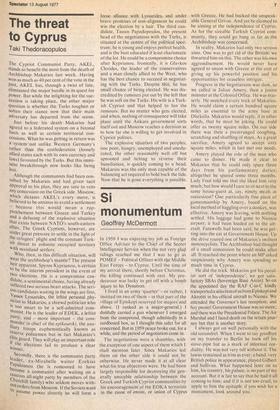The threat to Cyprus
Taki Thedoracopulos
The Cypriot Communist Party, AKEL, stands to benefit the most from the death of Archbishop Makarios last week. Having won as much as 40 per cent of the vote in the Past, AKEL has, through a twist of fate, eliminated the major hurdle in its quest for Power. But while the infighting for the succession is taking place, the other major question is whether the .Turks toughen or soften their stance now that their main adversary has departed from the scene.
Just before his death , Makarios had agreed to a federated system on a bizonal basis as well as certain territorial con
cessions.. What he was getting in return was a ' system not unlike Western .Germany's rather than the confederation (loosely allied states each with its own currency and laws) favoured by the Turks. But this immindnt breakthrough now looks like being. lost.
Although the communists Had been consulted by Makarios and had given tacit approval to his plan, they are sure to veto any concession On the Greek side. Moscow, Which dictates AKEL's every move, is believed to be anxious to avoid a settlement — because this would mean a rapProchement between Greece and Turkey and a defusing of the explosive situation that exists between NATO's south-eastern allies. The Greek Cypriots, however, are under great pressure to settle in the light of the refugees' plight and the constant Turkish threat to colonise occupied territory With mainland settlers.
Who, then, in this difficult situation, will wear the archbishop's mantle? The present heir apparent, Spyros Kyprianou, is certain , to be the interim president in the event of two elections. He is a compromise candidate, a sentimental choice, having already suffered two serious heart attacks. The serious candidates waiting in the wings are first, Vassos ' Lyssarides, the leftist personal physician to Makarios, a shrewd politician who is too smart to be a self-admitted communist. He is the leader of EDEK, a leftist Party, and — more .important — the commander in chief of the epikouriki, the auxiliary troops euphemistically known as reserve policemen but in fact Makarios's elite guard. They will play an important role if the elections fail to produce a clear winner.
Secondly, there is the communist party l_eader, ex-Mirabelle waiter Ezekias kraPaioanou (he is rumoured to have iDecome a communist after waiting on a raucous all-night party by members of the Churchill family) who seldom moves with?at orders from Moscow. If the Soviets want Lo assume power .directly he will form a loose alliance with Lyssarides,. and under brave promises of non-alignment he could win the election by a hair. The third candidate, Tassos Papadopoulos, the present head of the negotiations with the Turks, is situated at the centre of the political spectrum; he is young and enjoys perfect health, and is the best educated if least charismatic of the lot. He could be a compromise choice after Kyprianou. Ironically, it is Glavkos Clerides, the leader of the conservatives and a man closely allied to the West, who has the best chance to succeed in negotiating with the Turks. Despite thig, he has small chance of being elected. He was discredited by rumours put out by the left that he was soft on the Turks. His wife is a Turkish Cypriot and that helped to fan the rumours. But no matter who gets elected, and when, nothing of consequence will take place until the Ankara government sorts itself out and Moscow reaches a decision as to how far she is willing to get involved in Cypriot politics.
The explosive situation of two peoples, one poor, hungry, unemployed and uneducated, the other reasonably well off but uprooted and itching to reverse their humiliation, is quickly coming to a head. Makarios was the only man capable of the balancing act required to hold back the tide. Now that he is gone everything is possible.


































 Previous page
Previous page